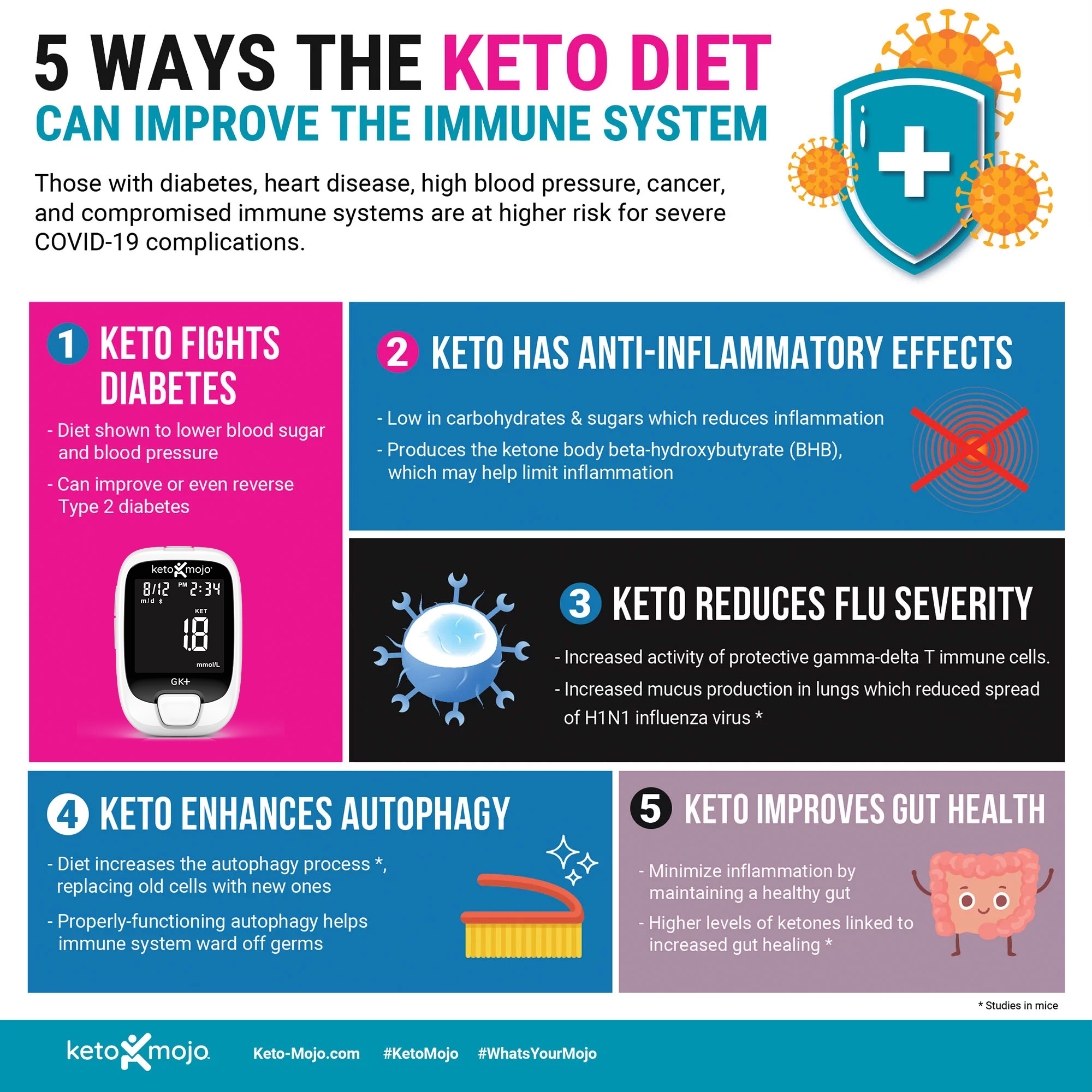As the coronavirus COVID-19 continues to spread throughout 2020, one thing has become clear: certain groups have an increased risk for severe complications. Beyond older age, these groups include those with diabetes, high blood pressure, heart disease, and kidney disease. What do these groups have in common? They tend to have compromised immune systems. In fact, beyond these specific medical conditions, a compromised immune system, in itself, puts you in a higher-risk category should you find yourself battling COVID-19 during the pandemic.
While we don’t have data on the ketogenic diet for coronavirus, we do know that a strong immune system helps us better combat and recover from viruses in general than a weak immune system does. We also have strong clues that the keto low-carb diet supports the immune system. One obvious example is that the keto diet can reverse type 2 diabetes – a condition that decreases immune function and increases one’s risk for severe COVID-19.
In this article, you’ll learn how COVID-19 is hitting certain groups harder than others, how the ketogenic diet affects the risk factors of these hard-hit groups, and how a high-fat diet can benefit the immune system far better than a high-carbohydrate diet can.
Quick disclaimer: This article is for informational purposes only. Nothing here should be taken as medical advice or as recommending a ketogenic diet to treat COVID-19.
Groups at High Risk for Severe COVID-19
COVID-19 doesn’t affect everyone equally. Certain people are at higher risk for developing severe pneumonia, ARDS (acute respiratory distress syndrome), and other complications if infected with the current strain of coronavirus, SARS-CoV2. These complications often prove fatal.
Age is the first risk factor. According to data from 72,314 Chinese case records, the overall fatality rate from COVID-19 was estimated at 2.3 percent. Most of these deaths occurred in patients over 70 years of age.
The Chinese data also showed that about five percent of all COVID-19 cases were “critical,” as opposed to “mild” or “severe.” Of these critical cases, about half of them had preexisting conditions including:
- Heart disease
- Diabetes
- Chronic lung disease
- Cancer
Many of these conditions, like diabetes and cancer, are well known to compromise immune function. The CDC is currently advising these groups to avoid social contact whenever possible.
Other conditions that weaken the immune system and likely increase COVID-19 risk include:
- Human immunodeficiency virus (HIV) and acquired immunodeficiency syndrome (AIDS)
- Primary immunodeficiency diseases (PIDs)
- Lymphohematogenous malignancy (LHMs)
Let’s dig a little deeper into two high-risk groups: Those with diabetes and those with high blood pressure.
Diabetes, High Blood Pressure, and COVID-19
Independent of age, diabetes and hypertension (high blood pressure) appear to be significant risk factors for developing severe COVID-19. The reasons why, however, aren’t yet clear.
One reason could be immunocompromisation. Diabetes impairs normal immune function (the body’s ability to fight off infection). This is an effect partially driven by high blood-glucose, and it could hinder one’s ability to fight off the virus.
Researchers also believe a protein called ACE2 is involved. ACE2 exists in the lungs, blood vessels, the kidneys, and the heart. What’s relevant here is that the coronavirus uses ACE2 to bind to (and infect) cells in the lungs. So anything that increases ACE2 expression, in theory, could worsen the SARS-CoV-2 infection.
That’s where diabetes and hypertension comes in. A large percentage of people with these conditions are on medications called ACE inhibitors to lower blood pressure. ACE inhibitors lower blood pressure – yes – but they also increase the expression of ACE2. (Confusing, yes, but understand that ACE isn’t the same as ACE2), and ACE2, as you just learned, may be pro-coronavirus.
Talk to your doctor if you have concerns about any medications you’re taking. The rest of this article reviews how the keto diet affects immunity and how you can strengthen your immune system using keto, which, in turn, strengthens your body’s ability to fight off viruses and infections.
Learn more about how the ketogenic diet can alleviate diabetes.
5 Ways Keto Benefits the Immune System
Since immunocompromised patients are at higher risk for extreme COVID-19, supporting the immune system in this population is critical. This means getting plenty of sleep, addressing any nutrient deficiencies, and eating a healthy diet. While no diet will prevent viral infection, some ways of eating are clearly better than others for improving immune health and giving your body a fighting chance to protect itself as best it can. The ketogenic diet, and keeping your body in ketosis where your body burns fat for fuel, is known for pro-immune system properties, which may be helpful in improving the immune system during this challenging time and in general.
Following are five ways the keto diet is known to improve the immune system:
#1: Keto Fights Diabetes
We already mentioned that people with diabetes are at higher risk for extreme COVID-19. The keto diet has been shown, in multiple studies, to lower both blood sugar and blood pressure in those with type 2 diabetes and hypertension. And when you improve or even reverse diabetes, you improve immune health too. How this applies to COVID-19, however, remains an open question.
#2: Keto has Anti-Inflammatory Effects
The keto diet is an anti-inflammation diet. When you eliminate the majority of carbs from your diet, you’re eliminating the majority of sugar, which is known to cause inflammation. But there’s more. When you eat a low-carb ketogenic diet, your liver responds by burning fat and producing ketones, including the ketone body beta-hydroxybutyrate (BHB), which, interestingly, may help limit inflammation.
Inflammation, by the way, simply refers to immune activity. This activity is meant to identify, contain, and destroy harmful infections. But sometimes, the immune response gets out of control and damages cells. BHB may mitigate this problem by modifying the inflammatory response. In mice, a similar immune modification resulted in decreased flu severity.
Read more about how the ketogenic diet reduces inflammation.
#3: Keto Reduces Flu Severity (in mice)
Move over chicken soup. In a 2019 study from the Journal of Immunology, researchers found that a keto diet protected mice from the H1N1 influenza virus. Here’s the study design. Half the mice were fed high-carb, half the mice were fed keto, then all mice were infected with flu. The keto mice fared better. After four days, all the high-carb mice were dead, yet half the keto mice had survived.
The benefits, according to the paper, were driven by specialized immune cells called gamma-delta T cells. These cells (which were more active in keto mice) increased mucus production in their lungs and helped limit viral spread.
#4: Enhanced Autophagy
Autophagy is a process by which cells recycle old, damaged parts and replace them with new ones. Out with the old, in with the new.
The immune system relies on properly-functioning autophagy to stay robust and ward off germs. Many pathogens have even evolved anti-autophagy mechanisms to avoid these defenses.
Where does keto come in? In rats, a ketogenic diet increased autophagy and protected their brains from seizure-induced damage.
#5: Gut Health
If you want to minimize inflammation, you need to maintain a healthy gut. When the gut becomes leaky, particles slip through the gut barrier, which in turn signals your immune system to attack. This is not a healthy immune response.
Keto may help. In a 2019 study published in Cell, higher levels of ketones were linked to increased intestinal stem cell production (which helps heal the gut) in mice. The keto diet also deprives pathogenic gut bacteria of their favorite food: sugar.
The Final Word
Let’s recap the main points of this article:
- Those with diabetes, heart disease, high blood pressure, cancer, and compromised immune systems are at higher risk for severe COVID-19 complications.
- The hypertension-COVID-19 link may be driven, in part, by increased ACE2 expression, a protein stimulated by drugs called ACE inhibitors.
- While great for weight loss, the keto diet may also support a healthy immunity by reversing type 2 diabetes, limiting inflammation, increasing protective T cells, enhancing autophagy, and improving gut health.
Finally, the best way to avoid infection is to avoid exposure to the virus. Please follow the CDC’s guidance for the latest recommendations on COVID-19 and consult with a health care professional before dramatically altering your diet.




